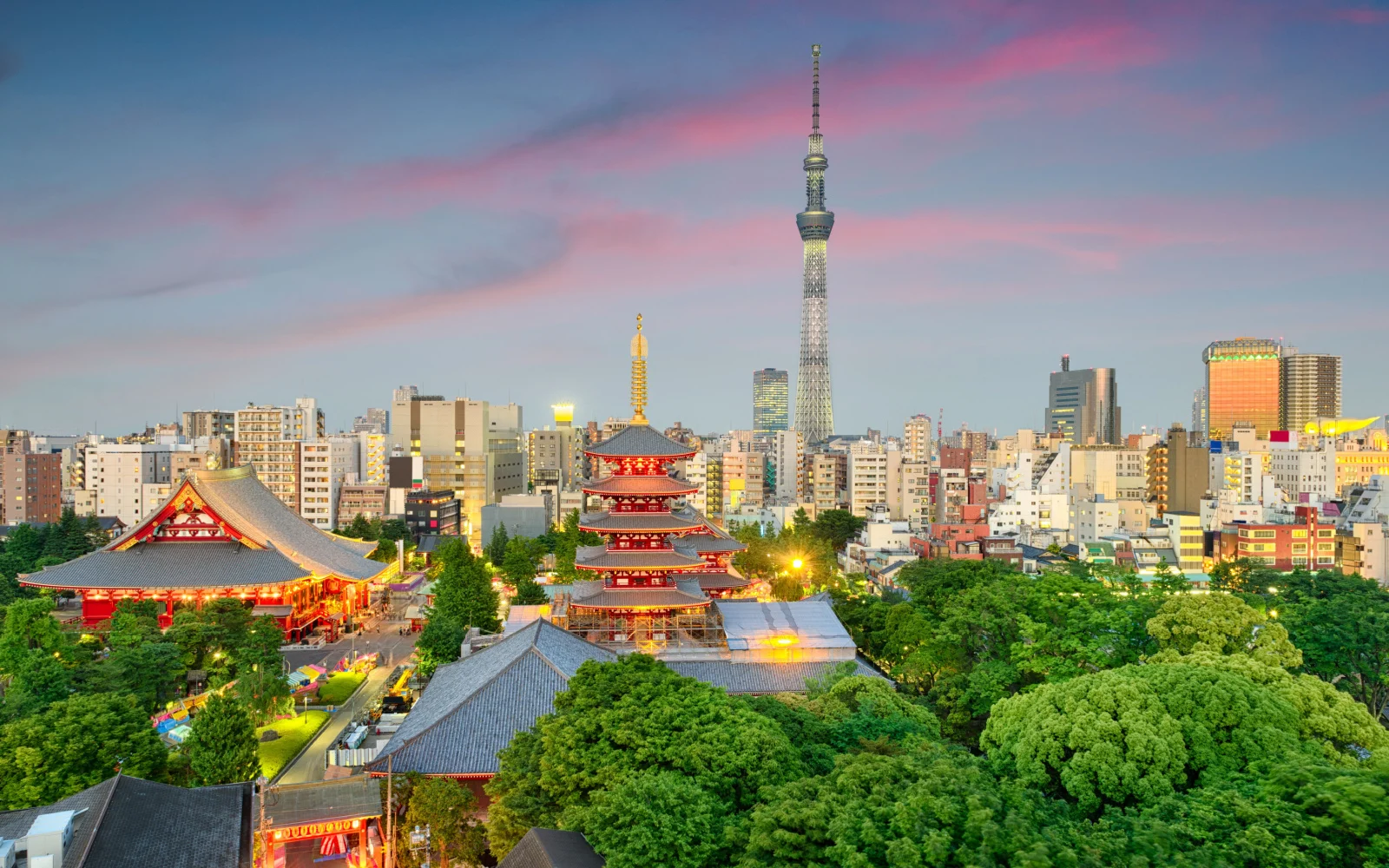Is Tokyo safe to visit in 2026?
Tokyo, the capital of Japan, is a bucket list destination for millions of people around the world. Every year, millions of people visit Japan, and many of them pass through Tokyo.
Tokyo is an ultra-modern city, which you can see at the famous bustling Shibuya Crossing. There is plenty of eating, drinking, shopping, and entertainment to do, such as wining and dining in Izakaya Alley or shopping in the famous district of Harajuku.
Of course, the city also has plenty for history and culture lovers, such as the medieval Sensoji Temple or quirky museums such as the Ghibli Museum.
With so much to see and do, you probably want to book your tickets immediately. However, before traveling to a new city, it’s always good to research your safety first.
Many big cities around the world are dangerous, and you might be wondering if Tokyo is on that list. Keep reading to learn more about general safety concerns and any precautions you may need to take. Let us be your guide!
Is Tokyo Safe to Visit in 2026?
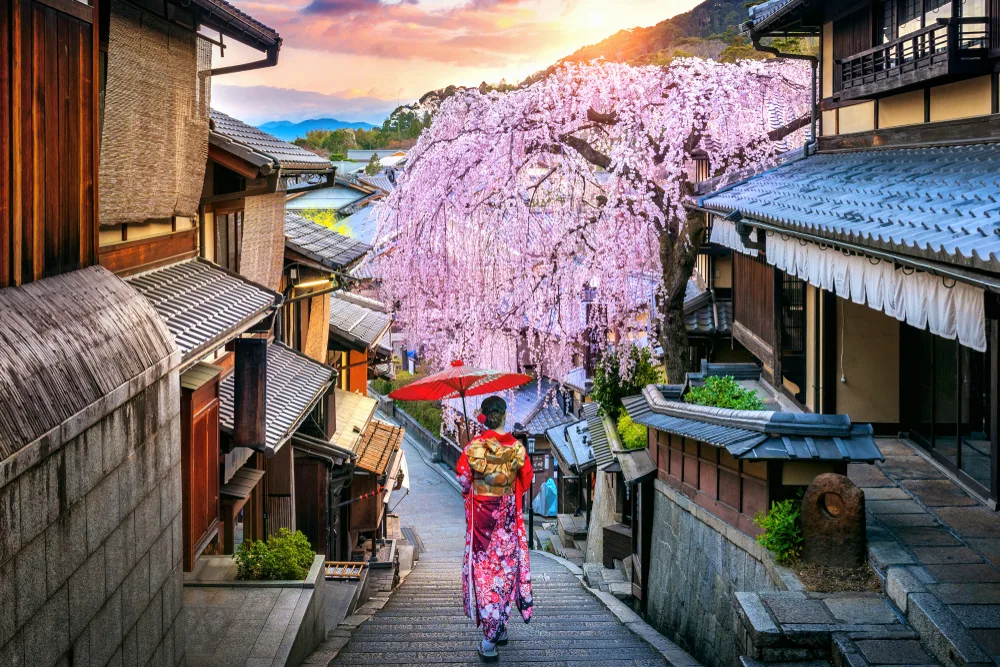
Guitar Photographer/Shutterstock
The good news for all lovers of Tokyo and Japan is that Tokyo is very safe to visit! The crime rate is very low, especially considering how big the city is.
Although there is some petty crime and some alcohol-related crime, with the right precautions, you will only have positive memories from your trip.
Tokyo is one of the biggest cities in the world, but it is also one of the safest cities in the world, even for travelers. In fact, the city was rated the 7th safest city in the world in a survey conducted by a travel insurance company.
Female travelers ranked it the safest city in the world for their travel needs. It helps that all of Japan is a very safe country to visit. Countries such as Australia only tell citizens to take normal precautions when visiting Japan.
If the whole country is very safe, then even big cities such as Tokyo will not be dangerous at all. Of course, it still has some problems, just like any big city.
These are mostly petty in nature, such as:
- Pickpocketing
- Bag snatching
- Street harassment
- Inappropriate touching
- Alcohol-related crime
Tourists have been victims of crime in Tokyo before, including some more violent crimes such as robbery and assault. However, tourists that experienced those crimes usually were acting a bit careless, such as getting too inebriated in notorious clubs.
The vast majority of tourists that visit Tokyo have a safe time, and a few precautions are usually enough to keep you safe from crime.
Besides crime, you should be aware of the risk of natural disasters when visiting. Japan is part of the Ring of Fire, a seismically and volcanically active zone in the Pacific Ocean. Natural disasters affect Japan frequently, including Tokyo.
Earthquakes strike frequently, including strong earthquakes. Besides earthquakes, Tokyo is also in the path of typhoons, strong summer storms that often cause heavy rain, wind, and flooding.
If you are visiting during typhoon season, make sure that you check the weather ahead of time. The Tokyo government prepared a disaster preparedness guide, including a version in English for expats and visitors.
If you are nervous about disasters, you can read the whole guide. Your hotel will also have earthquake evacuation information, so ask them for any tips once you get to Tokyo.
Crime in Tokyo
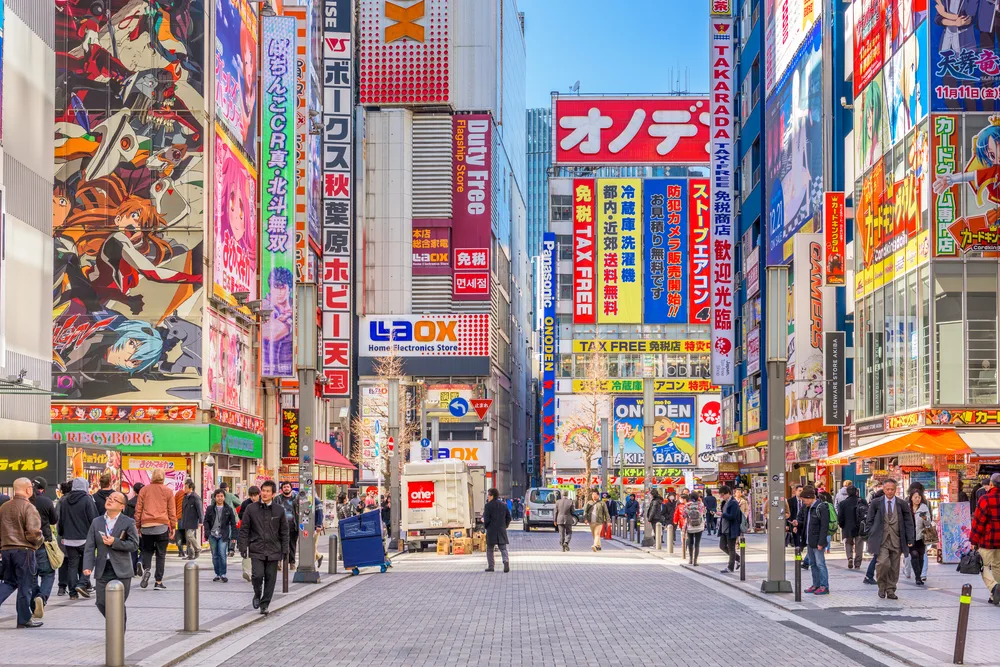
TOKYO, JAPAN – JANUARY 11, 2017: Crowds pass below colorful signs in Akihabara. The historic electronics district has evolved into a shopping area for video games, anime, manga, and computer goods/Sean Pavone/Shutterstock
Many people worry about the risk of crime when traveling abroad. This risk is especially present when traveling to big cities as whenever there are more people around, there are more opportunities for criminals to get away with their actions.
Luckily, the situation in Tokyo is very different. Tokyo has an absurdly low crime rate, especially when you consider that the entire metro area is home to over 37 million people.
According to Numbeo, which gathers survey data from residents to calculate a crime index, Tokyo scores a 20.8 out of 100 on the crime index, which is a low value.
People report low levels of concern about most crime and high levels of safety walking around the city, including at night. Even more comforting than the low crime statistics are the low violent crime statistics.
Japan overall has a homicide rate of 0.2 incidents per 100,000 people, and the rate for Tokyo is similarly low. The city has very low rates of gun ownership and very low rates of gun crimes, around 0.6 per 100,000 people.
That means that violent crime incidents are few and far between. In 2022, Tokyo and all of Japan experienced a slight rise in crime that made many people nervous.
However, by early 2023 the situation stabilized. Experts pointed out that the rise in crime was only evident when you compared 2022 numbers to the two years prior, when all of Japan (including criminals) was under strict COVID-19 lockdown protocols, preventing crime from happening.
There are a few reasons why it has such a low crime rate. One is that the city has fewer societal factors that contribute to crime such as unemployment levels and income inequality.
Another is that the culture of the city does not tolerate any disturbances to public order, including crime. Tokyo also has strict, efficient law enforcement, which plays a role in the city’s low crime rate.
There are police boxes called koban around many major intersections and crowded areas, which act as a deterrent for crime.
Japan also has very strict legal penalties that have been criticized by human rights groups in the past. Although these penalties may not be fair, they certainly deter crime.
Tokyo certainly has its problems such as petty crime, binge drinking, and harassment of women. However, most of these problems are inconvenient but not life-threatening. A few precautions are usually enough to keep you safe.
Petty Theft
The most likely crime you might encounter in Tokyo is petty theft. This crime occurs anywhere where there is a large population, plenty of crowds, and plenty of tourists.
Although Tokyo has done a lot to limit how many petty criminals there are in the city, theft is hard to eliminate completely. The Canadian government warns about the risk of petty theft in crowded areas of Tokyo in its travel advisory for Japan.
Pickpocketing and bag snatching can occur, as well as theft of unattended items and scams. Hotspots for theft include the area around Shibuya Train Station, especially at night, popular nightlife districts, trains, and public transportation.
Major tourist areas such as Akihabara are also common targets for thieves. The good news is that Tokyo pickpockets are hardly hardened criminals, and basic precautions are enough to deter them.
Make sure that your valuables are always within sight or close to your body, especially in crowded areas such as trains.
Never leave your bags or other valuables unattended, even in places that might feel safe such as restaurants or cafes. Renting a bike is a popular way to get around. However, bike theft is one of the most common petty crimes in the city.
Make sure that you always lock up your bike and ask the rental place if they have insurance in case the bike gets stolen, or if you have to replace it. Finally, be careful of common tourist scams.
The most common tourist scam is the begging “monk.” People dressed as monks walk around tourist areas such as Akihabara and Ueno offering blessings and a bracelet.
However, once you accept the gift, they force you to pay and get aggressive if you refuse. Buddhist monks are not allowed to beg for money, so rest assured that these men are just scammers.
Alcohol-Related Crime
Tokyo is a famous party destination but be careful when you go out as there are plenty of alcohol-related crimes that occur. The Australian government warns travelers to be careful in Tokyo’s nightlife districts such as Roppongi and Shinjuku.
While most bar and nightclub owners just want to make an honest living, some are looking for ways to take advantage of people, including foreigners.
Visitors have been victims of overcharging, robbery, and even assault in Tokyo’s bars and nightclubs before. Always watch your drinks and your intake when going out.
Keep a close eye on your beverages as drink spiking is common — for women and for men. Victims are incapacitated, then the robbers will run up high tabs on their credit cards or even take them to ATMs and make them withdraw money.
Make sure that you are not overdoing your limits, so criminals don’t take advantage of you when you are inebriated.
Binge-drinking is characteristic of the alcohol culture in Japan (it’s common to see businessmen just lying in the streets or around Shibuya station), but you don’t want to join in. Be careful about which clubs and nightclubs you choose to give your business.
If a place has an aggressive tout out in front, chances are that it is connected to some shady business. Trust your instincts and leave if a place feels sketchy or ask locals about which bars and clubs to avoid.
Avoiding Bad Areas
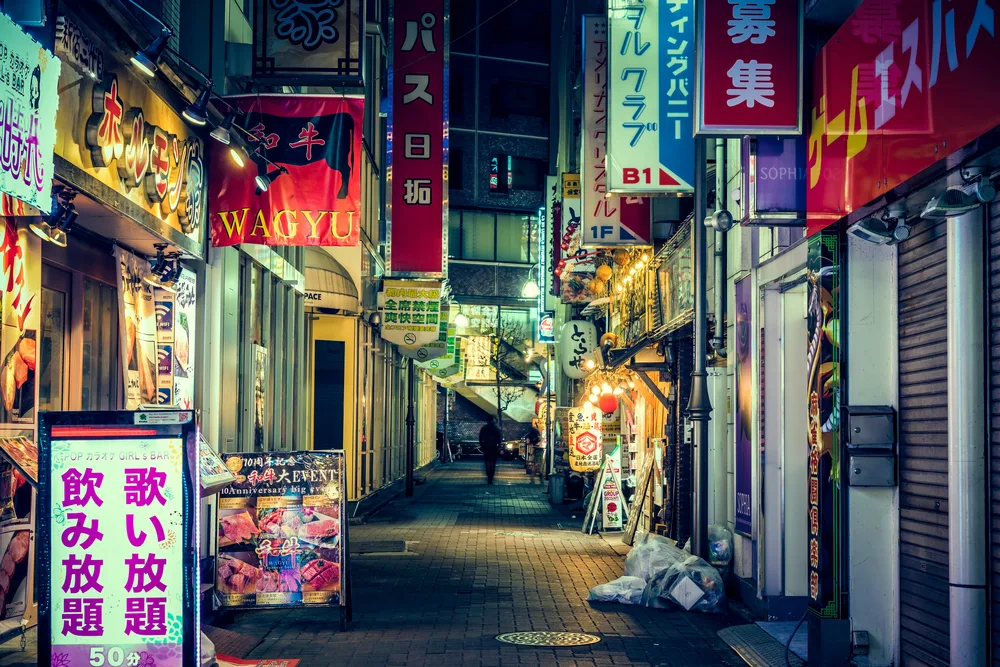
TOKYO, JAPAN – APRIL 2017 : Narrow city street in Shinjuku’s Kabuki district at night in Tokyo. Red-light district full of bars and restaurants/Marchello74/Shutterstock
Tokyo doesn’t have many dangerous areas per se, but there are a few places you should be careful. As mentioned above, be careful in nightlife districts such as Shinjuku, Roppongi, Ikebukuro, and Kabukicho as there are many alcohol-related crimes.
Be careful in crowded areas such as Shibuya Station or popular tourist attractions due to the risk of petty theft. Kamagasaki is a slum area on the outskirts of Tokyo which has high levels of petty theft.
Things to Consider
Here are a few additional safety tips for Tokyo:
- Women should take extra care when walking around at night. Although Tokyo is generally a safe city for women, there are some exceptions. The atmosphere in nightlife districts can get rowdy due to binge-drinking, and women are often harassed when they pass through. Avoid those areas, especially if you are alone.
- Research earthquake preparedness. They are frequent and unpredictable in Tokyo. If you are inside, take shelter under a sturdy object such as a table or doorframe. If you are outside when one hits, head to an open space so you can avoid falling debris.
- Don’t do any drugs. Japan has strict sentences for all crimes, including things that may not be crimes elsewhere such as smoking marijuana. Foreigners have been affected before, so don’t risk it.
- Research which ATMs you can use. Japanese people still pay for items mostly with cash. Foreign cards don’t work on all ATMS, just ones in Japan Post offices and convenience stores, so make sure that you get enough cash out when you visit those areas.
Frequently Asked Questions
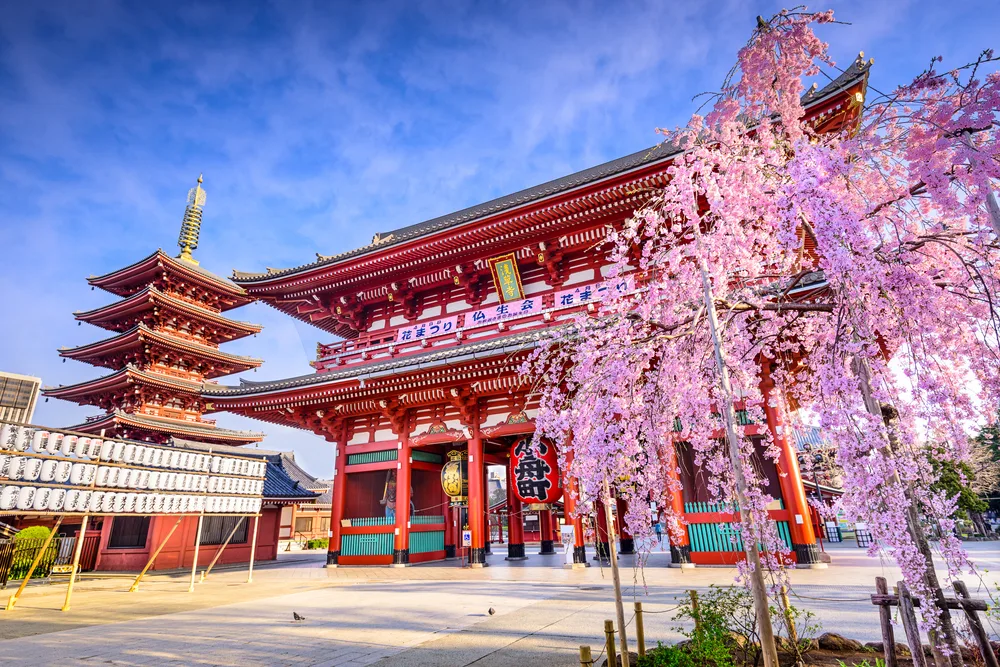
TOKYO, JAPAN – MARCH 29, 2014: Spring cherry blossoms at Sensoji Temple’s Hozomon Gate in the Asakusa District. Senso-ji was founded in 628 AD and is one of the most well known temples in the country/ESB Professional/Shutterstock
Here are some common questions you might want to ask before visiting Tokyo:
Is Tokyo safe for tourists?
Yes, Tokyo is very safe for tourists. Most visitors have a completely positive time here, and never experience anything remotely dangerous. The crime rate is very low and very little crime is directed at foreigners.
Is Tokyo safe at night?
Tokyo is one of the few big cities that feels just as safe at night as during the day. Busy areas such as Shibuya have plenty of people at all hours so you can feel safe in the crowd.
The only places where you should be a bit more cautious at night, especially if you are a woman traveling alone, is in the nightlife and red light districts.
Is Tokyo safe from tsunamis?
Tokyo is on the Tokyo Bay, a protected area that doesn’t receive many tsunamis. However, the only exception is after a strong earthquake such as the 2011 Fukushima earthquake, which caused a tsunami that even affected Tokyo.
Is Tokyo worth visiting?
Tokyo is a destination that is absolutely worth visiting. It has so much to do, from quirky museums to shopping for everything you can think of to eating delicious food.
Is Tokyo expensive?
All that safety comes at a cost — literally. Tokyo is one of the most expensive cities in the world for both living and visiting. You can go on a moderate budget if you save a little, but it is not the best destination for shoestring budgets.
So, Should You Travel to Tokyo?
Tokyo is one of the safest big cities in the world! Thanks to the low crime rate, you’re practically guaranteed to have a safe time as long as you take the right precautions.
So, with so much to see and do, what are you waiting for — book your trip to experience for yourself all that this picturesque city has to offer. Happy travels!



